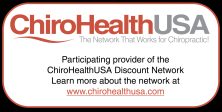Does Chiropractic Work?
I was recently discussing with a patient a problem that their sister was having with regard to back pain. She stated that her sister "did not believe in chiropractic" and wondered if I had any information she could give her sister. I discussed the several studies which have been published with regard to the benefits of chiropractic.
The question has been raised many times in my past as I was raised in chiropractic environment having my grandfather and father in the profession. The question of "Does chiropractic work?" was first looked at seriously in the early 1970's when the Medicare system accepted chiropractic reimbursement. Later, in 1975, the National Institute of Health called a conference which represented the various health professions that utilized the practice of manual treatment. This included medical doctors (manual medicine physicians), osteopaths as well as chiropractors. The information shared at that conference prompted the formation of various research counsels such as the Foundation for Chiropractic Education and Research. Singe 1975, spinal manipulation has been one of the most studied forms of treatment of musculoskeletal disease. As a result of this influx of research information, there is no doubt that "chiropractic works."
One of the most recent publications in regard to this issue can be found in the publication from the U.S. Agency for Health Care Policy & Research (AHCPR) which stated that the treatment of acute low back pain should include: 1) spinal manipulation; 2) no more than a one- to two-day time period of bed rest, and; 3) nonsterodial, anti-inflammatory drugs (NSAIDs) such as ibuprofen, aspirin, or Naprosen. Moreover, they stated that conservative treatment (such as manipulation) should be pursued in most cases before surgical intervention is considered. It was also stated that prescription drugs such as oral steroids and anti-depressant medications are not recommended for acute low back pain problems. Similarly, Britain released back pain guidelines which are very similar to the AHCPR guidelines which recommended manipulation, active exercise, over-the-counter NSAIDS, and a maximum bed rest of on to three days. Their document also encouraged early activity and recommended avoidance of work absenteeism.
Approximately one year ago, Canada released their findings stating that chiropractors should be the first professionals consulted for assessment of back pain. If further treatment is needed, the chiropractor can then refer the patient to the appropriate specialist. This recommendation was stimulated by studies which found chiropractic to be more cost effective and result in a more prompt return to work by an injured worker. These studies, as well as other, have helped the general population better understand that chiropractic is becoming the recommended form of treatment for back pain.
With the advent of research, the accreditation of all chiropractic colleges, a core curriculum taught at chiropractic colleges that parallels for the most part the medical model of education, and the improved communications between the medical and chiropractic professions, patients now do not have to "hide in the closet" with regard to their utilization of chiropractic services. Moreover, I am receiving referrals from medical physicians to a greater extent each year as this knowledge gap between the professions improves. In line with these changes which have taken place over the year, the doctors at Yeomans-Edinger Chiropractic Center have recently obtained hospital privileges at Ripon Medical Center and are enjoying the ability to access the various services at the center with less obstacles for the betterment of patient care.
So the next time the question is asked to you, does chiropractic work, you can say with confidence that the research supports chiropractic and that several countries including the United States, Canada, and Britain have published position papers, one recommending chiropractic as an initial portal of entry for acute low back pain.
If you would like further information regarding chiropractic, please feel free to contact our clinic.





